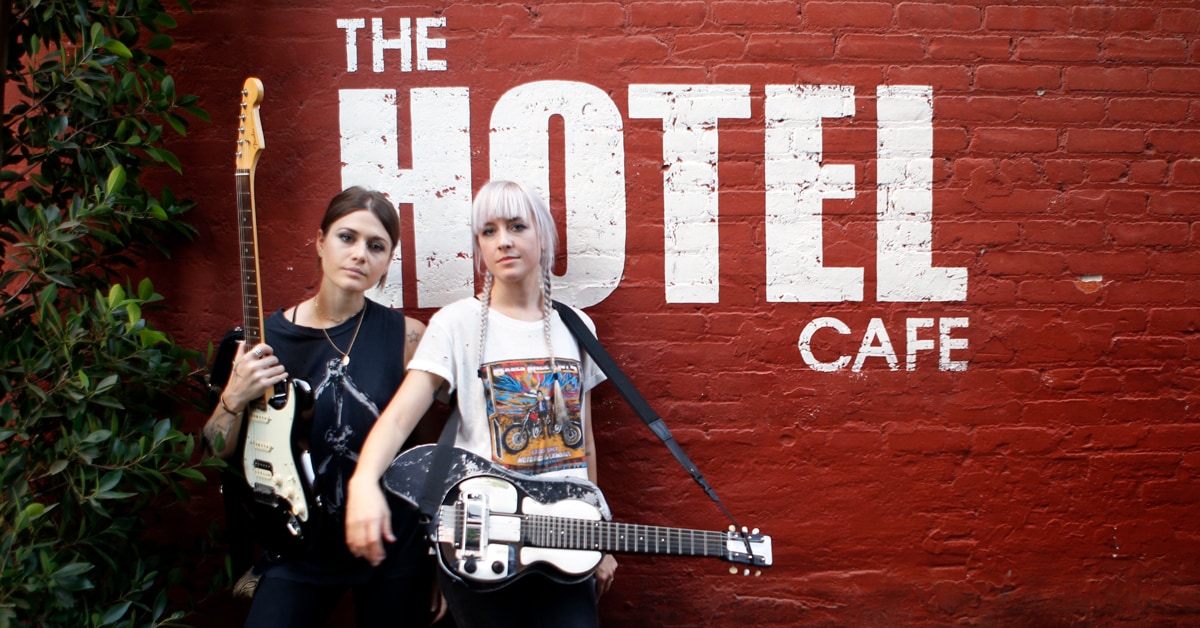Georgia-native sisters Rebecca and Megan Lovell have made quite the name for themselves "trying to push the boundaries of the blues with modern sound elements", as described by lead vocalist and guitarist Rebecca. We sat down with the band before their show at the Hotel Cafe in Hollywood to talk about the inspiration behind their self-produced new record Peach, touring with Elvis Costello and how hip-hop helped them rethink their approach to modern blues.
Tell us about your main guitar.
Megan (guitar, vocals): I play an old 1940’s Rickenbacker lap steel guitar. I love it - it’s got a great sound.
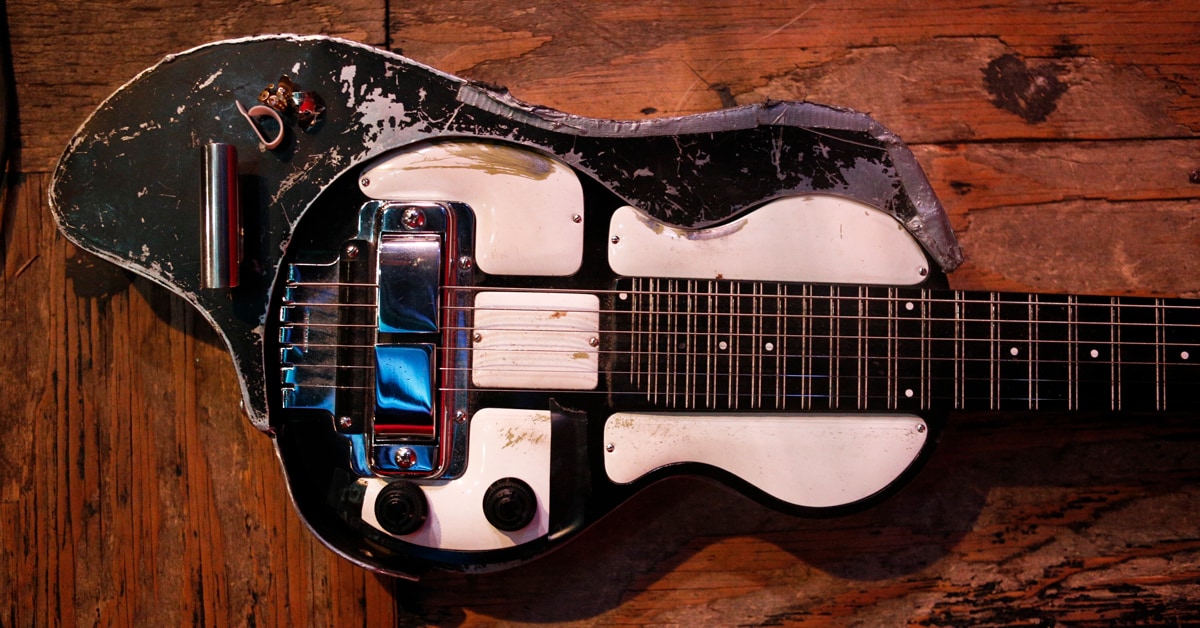
And you mentioned you had one previous to this?
M: The first lap steel I bought was a Rick, and I just fell in love with it. When we were on the road with Conor Oberst in NYC, we were in a taxi cab and the driver slammed his breaks - the guitar went flying and the neck broke off of it! I was so heartbroken. I immediately started searching for a new one, and I actually found one at Guitar Center in Knoxville, TN and had it shipped to my house.
We’re glad it made its way into the right hands! What is about the lap steel that fits your style?
M: I’m drawn to the slide because I love singing, but I feel like my voice as an artist is more in the slide guitar than through my real singing voice. I started out on Dobro, actually. When we started playing rock and roll, that’s when I switched over. I think I just landed on the Rickenbacker by chance, and it really matches me. It’s such a mellow sound, and that’s what I’m looking for in a slide. I wanted to stay away from the really tinny-sounding instruments because I think the metal-on-metal can sound really piercing.
What is the output like on a lap steel?
M: It’s kind of low gain in comparison to an electric guitar – it’s definitely lower, but not by much. I treat it with a Tube Screamer, so I give it quite a bit of drive and low-end. On the amp & pedal, I turn the tone all the way on the low end to counteract the tin sound. Everything I pass through, I’m shaving off high end.
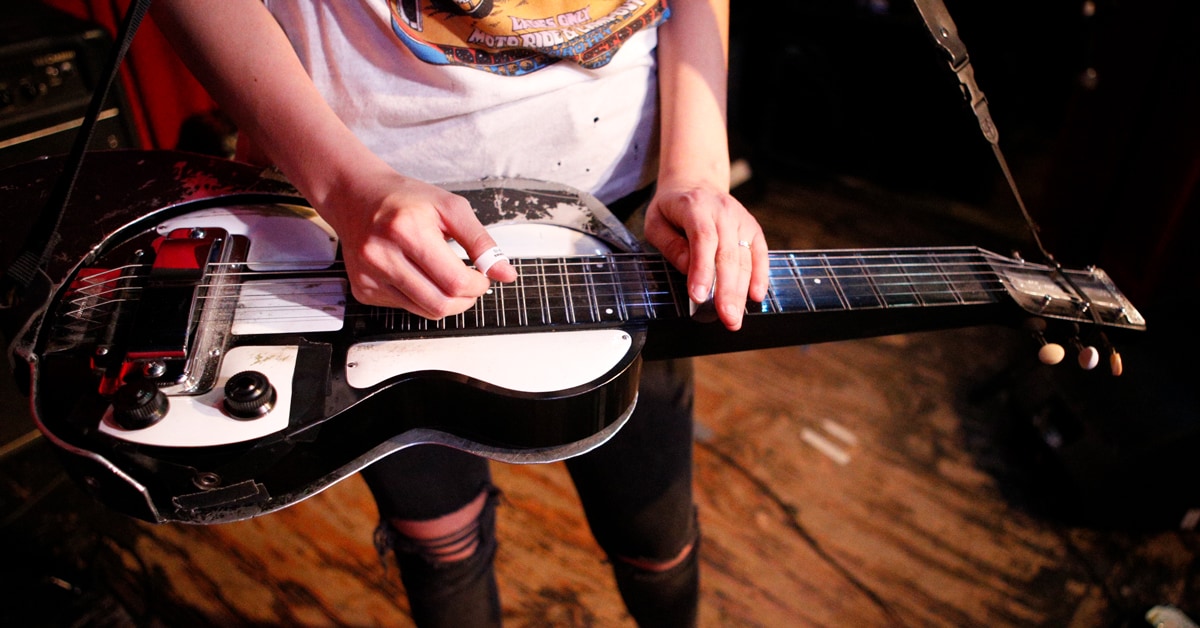
Very cool. So Rebecca, tell us about your Strat.
Rebecca (main vocals, guitar): I play a Fender American Professional Stratocaster. My first guitar was actually a Fender Jazzmaster, back when I didn’t know much about guitars at all. We both grew up playing violin & piano as kids - then I picked up banjo, and then mandolin. I played acoustic guitar always – electric guitar was pretty much terrifying to me. We’d never played through amps electrically. At first, it was so aggressively loud that I think I was hesitant to really dig into it for many years. But then, I think I became more deaf & desensitized, so I dug in a little more. I’m a huge Stevie Ray Vaughan fan – I don’t play like him, but the fact that he played a Strat was sort of my inspiration. They’re very versatile instruments – I like the fact that my Strat has a Shawbucker in the bridge, because it helps drive amps in a cool way, which I dig.
M: We play through Fender amps as well, so we’re pretty much part of the Fender Fam.
R: Exactly – it was easy to switch over.
M: On the road, we’re playing through a Fender Deluxe and Twin Reverb, but at home I have a Vibrolux, which is beautiful.
R: I have a Princeton and Pro Reverb at home, too.
What is it about the Strat that makes it your choice for live shows?
R: I play it every night - mostly because it’s the least complicated instrument I have. Especially on the neck – I don’t have to fight with it at all. I’ve been playing electric guitar for about 4 years now, and I still don’t consider myself a hugely consistent player. Little things can set me off. So the fact that it’s easy to play sets me up for success, and I like not feeling worried.
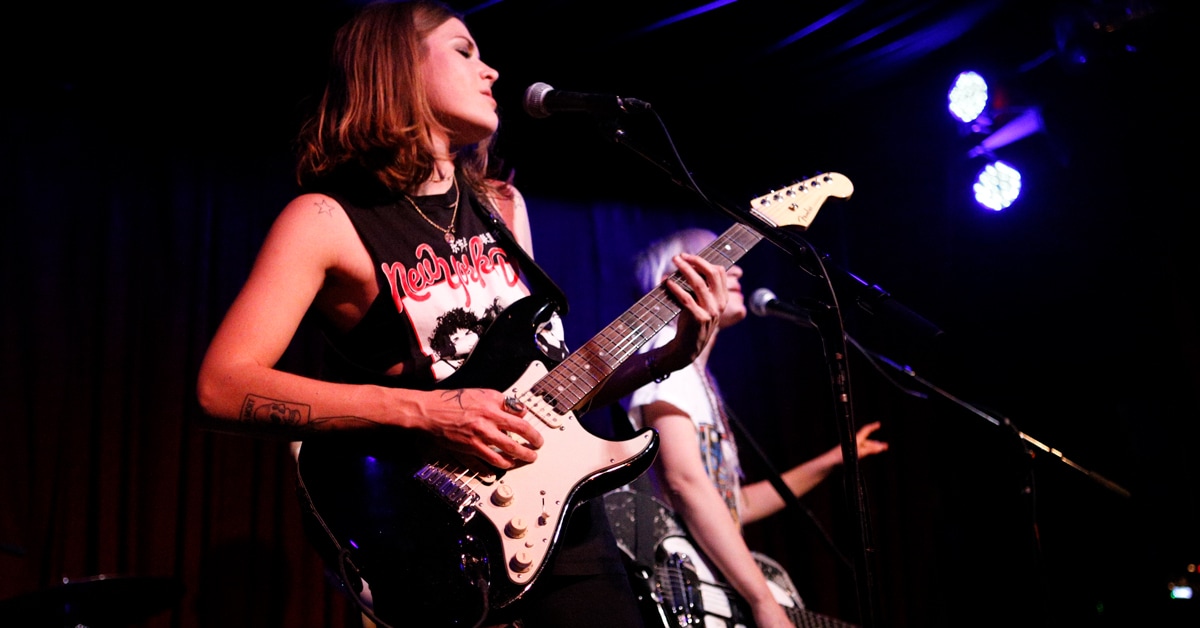
Do you remember the first instruments you ever had?
M: The first instrument we ever played would have been when Rebecca was 3, and I was 4 – remember those tiny violins? I can’t remember what they were or what they sounded like.
R: Those were little machines of death. Our mother had incredible patience to allow us to have those. But the first instrument that made a difference for me was actually the banjo I had built by a local luthier in Northern Georgia named Bobby Burns – he built this banjo, and it’s a total work of art. It’s a solid, curly-maple back and it’s gorgeous. I used it the first time we got on stage as a bluegrass band - I played a banjo solo and was like, “Hell yeah!” It was a magical moment.
M: My first instrument was this gorgeous Scheerhorn Dobro – it’s still one of my most prized possessions. One of the ones that barely comes out of the case, because you’re so worried about what might happen to it.
Early on in your careers, do you remember a specific moment that you each realized, “Wow, I can do this - I'm a musician.”
R: On a couple of different levels, yes. When I was about 17, I started playing competitions as a mandolin player - I ended up placing second in an international mandolin competition. Then, I went on to compete in an esteemed festival called MerleFest - I became the first woman to ever win it. I think that was incredibly empowering. I realized “Oh, if I go home and I practice my scales – seriously give them the attention they deserve – I can adopt that language.
M: Coming from classical violin, there was a period of time when I was trying to make the transition from sheet music to improvising. I remember when we first started playing with Elvis Costello, he brought us on stage to back him up. Having him trust us enough to follow him wherever he went was huge, because he would step away from the song we had rehearsed into something we had never heard before. Having somebody say “I have faith in you, you can do this” – that was the moment for me when I started to trust myself.
That’s huge. What is it about the guitar that you think resonates the most with people?
M: Music is a universal language. You don’t have to be able to speak English to understand it. I trip up my words sometimes, and I don’t feel like I’m a very good singer. But on lap steel, I feel like I can say something and people understand me. And I can look into an audience and actually make a connection with my solos in a way that I can’t necessarily with my words.
R: You’re getting teary eyed, you’re gonna make me cry!
M: Don’t point it out! [laughs]
R: It’s so true though, well said.
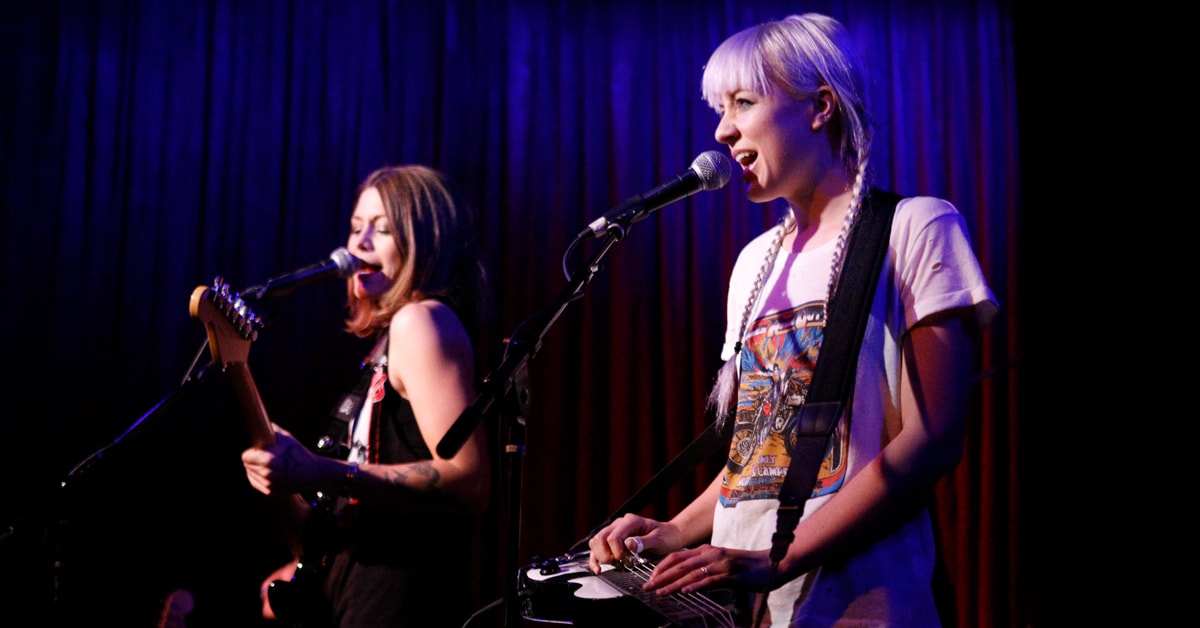
Fair enough – no more feelings stuff! Let’s talk rigs - what’s the newest pedal or piece of gear you have in your setup?
M: My newest pedal is a Big Muff – I have the Wicker.
R: It’s funny, because I purchased one for myself as a tour present – we were touring for 8 weeks in Europe, and I wanted to get myself something nice. So I bought one of those bad boys, and no soon after Electro-Harmonix hit us up on social media and sent us a bunch of Big Muffs. Those are actually the newest pedals in our collection – two really classic sounds. Can’t beat it.
Tell us about the delay you guys have on your board – is it a surprisingly inexpensive piece of gear you can’t live without?
R: We actually found these in a music shop that was run by our friends in the UK. These little tiny, itty-bitty MOOER pedals, like $30 or $40 bucks each. Megan got one first, and then I got really jealous so then I got one. They’re cool.
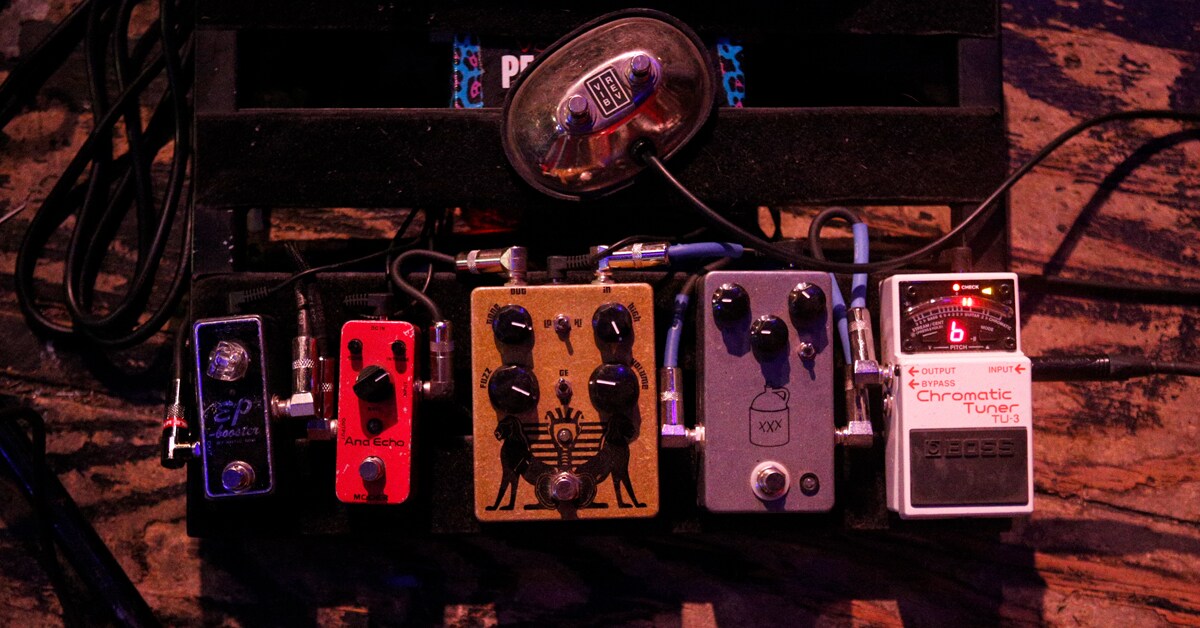
Do you guys practice while you’re touring on the road?
R: I practice obsessively. I play a lot because I feel like I’m behind, actually – my sister shreds on a lap steel in a way I don’t do as readily. As a lead singer, I’m singing 90% of the show, so I’m not able to focus on playing. That’s why whenever I hit the hotel room or the venue, I’ll just pull it out and play. We’ve taken it upon ourselves to start posting cover videos, a few a week - which means we’re learning classic songs as a way to hone skills and pick up new tricks and tips from other songs.
M: That’s a huge learning tool.
What are you learning from each of these cover songs?
R: I think people give covers a bad rap - always saying “Do more originals!” But I think they're worthy if done in the right spirit - which, for us, it’s learning vocabulary of some songwriters who are a bajillion times better at writing songs than we are. Learning how to make it sound like you. Whenever we learn someone else’s song – Creedence, Elvis Costello, Michael Jackson, or Lana Del Rey – you know, fill in the blank – the goal is to make it sound like Larkin Poe. I think that’s the biggest glue we’ve realized from learning these tunes. You don’t want to quote it directly, because they’ve already done it – you want to surprise people with songs they may not know they would love. It’s a fun surprise - like a Kinder egg.
Is there a song you’ve covered that surprised you by how nicely it fit into your set?
R: Actually, the majority of them. We wanted to do something off of Sgt. Peppers, for example – we didn’t have a lot of faith going into it. We ended up learning “Within You & Without You” – when we were in the thick of it, we were like “Oh it seems like it could be really good idea because of the vocal, sitar, whatever they’ve got on the recording” – Megan had to learn it, and you were not having fun.
M: I was not. [laughs]
R: It was uncomfortable at first, but once we’d done it about 30 or 40 times, suddenly it was sort of mesmerizing and almost therapeutic. I was glad we had pulled through, because it actually meant something in the end.
M: I think we’ve also been surprised by traditional blues tunes – how much they feel relevant, and feel like us, which is why half of our new record is traditional blues songs. It works well for us.
You described your process as “mesmerizing and therapeutic” – do you go into a meditative state in the studio?
R: On a good day. When you’re not having to fight with your ego, or own insecurities.
M: Yeah, I think it’s the highlight of my life. When you’re in the flow of music.
As musicians who’ve played more shows than you can remember, how do you deal when something goes wrong on stage?
R: That's what the years are for. When I first started playing electric guitar, I would break 2-3 strings a show, because I was used to playing acoustic instruments, where you have to play more aggressively to get good tone. I would disrupt the show every 20 minutes by needing to change a string. You learn how to gloss over it, because we are human, after all.
M: I think time & experience makes a big difference. I’m so thankful now to be in a place, after having toured for a decade, where it takes a lot to mess us up on stage. We’re pretty well settled at this point.
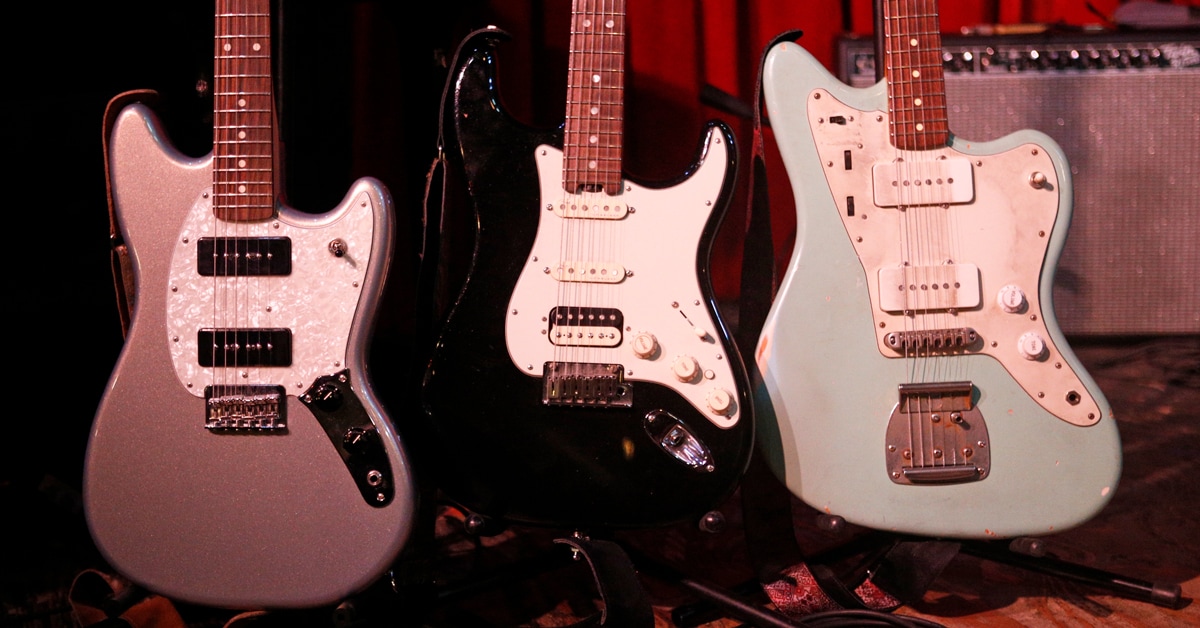
It’s always encouraging to hear that from seasoned musicians – everyone has to deal with mistakes and technical difficulties. So let’s talk about making Peach, your new record - what cool gear did you guys employ?
R: We actually recorded everything ourselves, and a lot of the record we recorded in one room, just Megan and I. We’d cut a guitar, then a vocal, and then build on top of it . Honestly, to me, the biggest innovation we undertook for ourselves for this record was playing everything ourselves – I programmed all of the drums, and we played all of the keys & synths which we didn’t have a lot of experience doing. But we had a vision in mind, so we sort of cobbled it all together. I’m really proud of the fact that, not being a drummer, I was still able to sit down and create some sonic palates with drums and 808 sounds, trying to push the boundaries of the blues with modern sound elements. It was really exciting. It’s a solid record of whatever “it” is that we did.
Absolutely. Were they any specific players you kept in mind when programming synth/drums?
R: I feel like you can’t help but be influenced by what you’ve listened to previously. For me, leading into the record, I love hip hop. We’re from Atlanta, and there’s a big hip hop scene where we come from. Lately, I’ve been listening to a lot of Machine Gun Kelly – I think he’s doing a lot of really cool things for rock, by nature of the fact that he’s got as much guitar in his music as many alternative rock bands have in their soundscapes. Getting to be at his show and watching how it was moving people in the crowd, I really wanted us to incorporate a little of that into what we were doing – especially in terms of beat and groove structure.
Which songs are you most excited to play tonight?
M: I’m most excited to play “Look Away” – it’s a very fun one.
R: I’m looking forward to playing Wanted Woman. A lot of people assume it’s an AC/DC cover, because it’s actually married with another song we wrote called “AC/DC”, so it’s sort of like a fun package of two songs that are very aggressive and high energy.
Stoked to hear. Do you notice a difference playing the songs in the studio versus on stage?
R: I think they translate. At the core, they’re songs – even when the dress is a little bit different, the song is still underneath.
M: Some of the songs on the record are tunes that we played, just the two of us. They translate well because we recorded them live in the studio for the record, so playing them live on stage isn’t that much different. Just a little bit heavier, hopefully.
You can check out Larkin Poe's newest album Peach, and stay up-to-date on latest tour stops.




